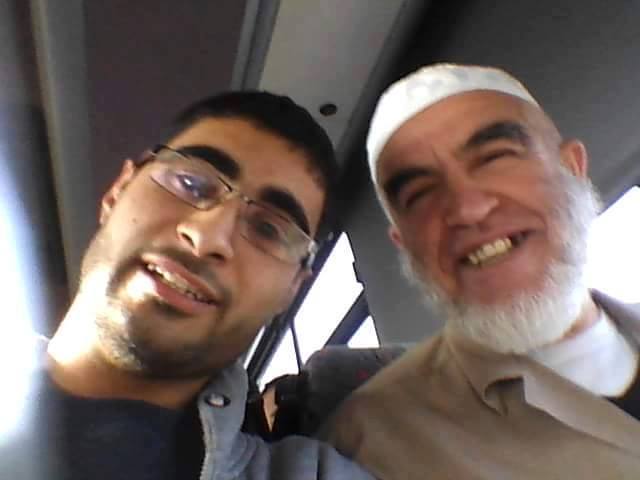 Prominent Palestinian sheikh and Islamic Movement leader Raed Salah from Palestine ’48 was released from Israeli prison on Tuesday morning, 17 January after 9 months of imprisonment, during which he was held in solitary confinement. When he was first released, his location was unknown; his lawyers, Omar Khamaiseh and Khaled Zabarqa, said that he was supposed to be released at 6:30 am at Ramon prison, and a crowd was outside the prison to wait for him, but the Israeli prison administration refused to reveal his current location except that he is not in the custody of the IPS. Apparently, however, Salah was transferred to another prison after his release and was put on a public bus to Umm al-Fahm in Palestine ’48 without a means of communication and without notifying his lawyers or the crowds waiting for him. Even now, his lawyers are awaiting full contact with him to ensure his safety.
Prominent Palestinian sheikh and Islamic Movement leader Raed Salah from Palestine ’48 was released from Israeli prison on Tuesday morning, 17 January after 9 months of imprisonment, during which he was held in solitary confinement. When he was first released, his location was unknown; his lawyers, Omar Khamaiseh and Khaled Zabarqa, said that he was supposed to be released at 6:30 am at Ramon prison, and a crowd was outside the prison to wait for him, but the Israeli prison administration refused to reveal his current location except that he is not in the custody of the IPS. Apparently, however, Salah was transferred to another prison after his release and was put on a public bus to Umm al-Fahm in Palestine ’48 without a means of communication and without notifying his lawyers or the crowds waiting for him. Even now, his lawyers are awaiting full contact with him to ensure his safety.
Though released, he will not be entirely free; just yesterday, he was placed on a six-month travel ban. In addition, Israeli police have stated that they are “investigating” additional allegations of “incitement” against Salah and may request new charges against him.
Salah was imprisoned for “incitement” in the case of a sermon he delivered in 2007 in Wadi Joz after Israeli occupation officials demolished a bridge leading to the Maghareba gate. Despite legal challenges and a hunger strike, his solitary confinement was retained throughout his imprisonment and he was denied access to newspapers and books.
On Monday, far-right Interior Minister Aryeh Deri signed an order prohibiting Salah from travel for a 6-month period. Earlier, lawyer Khaled Zabarqa stated that Salah was repeatedly interrogated while in prison about other potential charges of “incitement,” saying that Israeli interrogators were “opening new files concerning his speeches and activities in Al-Aqsa.” The Islamic Movement, Salah’s political movement, was banned in Palestine ’48 and many associated institutions closed and raided. Palestinian organizations across the political spectrum denounced the ban on the Islamic Movement as an attack on all Palestinians.
The most prominent recent example of this attack on prominent Palestinians in ’48 has been the prosecution of Member of Knesset Basel Ghattas of the Joint List, accused of attempting to bring cellular phones to imprisoned Palestinians. Ghattas was released from house imprisonment, but barred from participating in parliamentary activities. Now, the Knesset is beginning procedures to remove him altogether using a law that had earlier been highlighted as targeting Palestinians.
Discover more from Samidoun: Palestinian Prisoner Solidarity Network
Subscribe to get the latest posts sent to your email.




